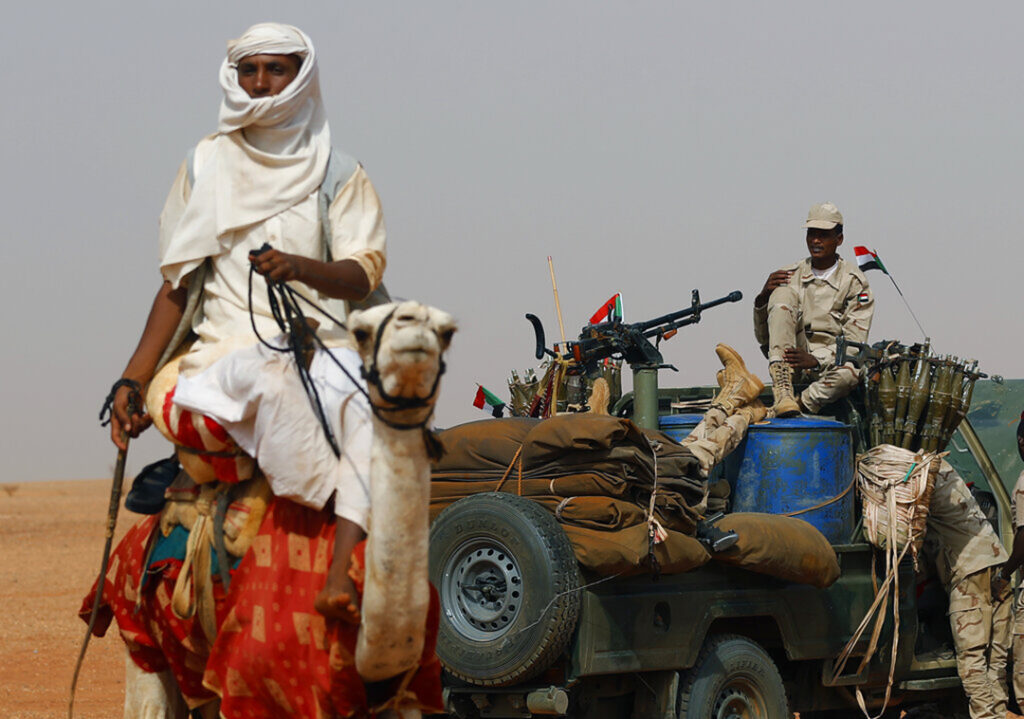ADF STAFF
Attacks in West Darfur are awakening fears that the region could return to the violence of its darkest period. Humanitarian groups and international organizations are calling for an intervention as the conflict escalates.
In mid-June, a land dispute between two tribes near the town of Kulbus led to the death of more than 100 people and forced thousands to flee. Witnesses and human rights groups say forces controlled by the second-in-command of Sudan’s ruling junta are supporting Arab fighters in the attacks and are heightening the violence.
Abkar Altom Adam, secretary-general of the Gimir Shura Council, told the Sudan Tribune that the Rapid Support Forces (RSF) backed the Arab fighters from the Rizeigat tribe in its attacks against members of the non-Arab Gimir tribe.
The violence near Kulbus in mid-June grew out of a dispute between a Gimir man and a Rizeigat man over agricultural land and went on for days. Both men died in the gunfire that erupted during the initial fighting, according to the United Nations Office of Humanitarian Affairs.
The Gimir and Rizeigat tribes have reconciled in South Darfur, but the outbreak of violence in West Darfur was part of a pattern of fighting between the groups over the past two years.
Violence in West Darfur has increased since the military coup in October 2021 that interrupted the transition to a civilian government. Attacks have led to the deaths of health care workers and children.
“Neither Sudan’s transitional government nor the current military rulers have meaningfully addressed the underlying causes of the violence in Darfur,” Human Rights Watch (HRW) wrote in a recent report on the violence in West Darfur. “Impunity for abuses remains the norm.”
Sudan’s government continues to fail to address marginalization, disputes over control of and access to land and natural resources, and a lack of justice for past and ongoing abuses, HRW said.
A separate outbreak of violence in April between the non-Arab Massalit and their Arab neighbors killed more than 200 people in West Darfur’s Kereneik area, forced 124,000 people to flee, and left multiple villages looted and burned, according to the U.N. Office for the Coordinator of Humanitarian Affairs.
“The last two months have shown all too starkly the devastating dividends of withdrawing peacekeepers and ignoring the ongoing need to protect civilians in Darfur,” HRW’s Sudan researcher Mohamed Osman said in the report.
Abdel Rasoul al-Nur, executive director of the Kulbus locality where the violence broke out in June, told the Sudan Tribune soon after the violence happened that 111 people from the Gimir tribe were killed.
“There are dozens of missing people who have not been found,” he added. He said he had no information about deaths among the Arab tribes involved in the fighting.
Abkar al-Toum, a tribal leader in Kulbus, told Al-Jazeera that at least 62 people were found burned after fighters set fire to 20 villages.
Local authorities deployed troops to separate the groups and protect local water sources.
In the weeks after the initial outburst of violence, the death toll rose to more than 125, including 25 Rizeigat tribe members, and the number of people who fled the fighting reached 50,000, according to the U.N. Office for Humanitarian Affairs. More than 15,000 people fled to neighboring North Darfur.
The current spasm of violence echoes the war that broke out in the Darfur region two decades ago when then-President Omar al-Bashir used Arab herders known as the Janjaweed to attack non-Arab African tribes who had complained of discrimination by the government.
That violence killed 300,000 people and left 2.5 million homeless.
Human rights groups say many of the former Janjaweed now are members of the RSF controlled by Gen. Mohamed Hamdan Dagalo, second in command to coup leader Gen. Abdel Fattah al-Burhan. Dagalo is known by the nickname “Hemedti.”
The recent violence brought swift condemnation from the international community and demands that the violence stop.
Toby Hayward, Sudan coordinator for the U.N. High Commissioner for Refugees, said the violence puts the security of the entire region at risk.
“If there is no intervention or mediation, and violence is allowed to continue, farmers will not be able to cultivate, and the agricultural season will fail,” Hayward wrote on Twitter. “This would be disastrous for all communities.”

